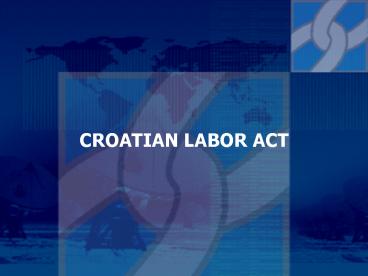CROATIAN LABOR ACT - PowerPoint PPT Presentation
1 / 17
Title:
CROATIAN LABOR ACT
Description:
Changes to the labor code, entered in force on June 8, 1995 ... Act on Changes and Supplements to the Labor code, entered in force on March 6, 2001 ... – PowerPoint PPT presentation
Number of Views:20
Avg rating:3.0/5.0
Title: CROATIAN LABOR ACT
1
- CROATIAN LABOR ACT
2
Labor Act
- Entered in force on June 16, 1995
- Changes to the labor code, entered in force on
June 8, 1995 - Changes to the labor code, entered in force on
September 11, 1995 - Act on Changes and Supplements to the Labor code,
entered in force on March 6, 2001 - Amendments to the labor code, entered in force on
September 24, 2001 - Amendments to the labor code, entered in force on
July 16, 2003
3
Discrimination Prohibition
- Discrimination of persons looking for job and
workers are regulated in a new way - New discrimination basis is established sexual
orientation - Difference between direct and indirect
discrimination - Right to compensation in case of discrimination
- Employer has to prove that there was no
discrimination
4
Fixed-duration labour contract
- - Limitation of contract duration considering
that the person works in the same position (3
years) - Consequences of signing of the fixed-duration
labour contract opposing Labor Code stipulations
- it is presumed that fixed-duration contact is
the open-ended labour contract
5
Protection of Workers Dignity
- Protection of workers dignity is regulated as a
special protection from harassment and sexual
harassment - Employers obligations in the process of
protection of workers dignity is regulated - In case of legal proceedings, the employer has to
prove that hes not guilty - It is prohibited to discriminate workers who
oppose any treatments or behavior endangering
their dignity
6
Notice Period Minimal Length
- Notice Periods
- - 2 weeks in case the worker has continously
worked for the same employer for less than one
year - - 1 month for 1 year
- - 1 month 2 weeks for 2 years of work
- - 2 months for 5 years of work
- - 2 months and 2 weeks for 10 years of work
- - 3 months for 20 years of work
- - Has been implemented since January 1, 2004
7
Identification of the lowest severance pay
- Workers with fixed-duration labour contracts are
also entitled to severance pay - 1/3 of the average monthly salary the worker had
in three months prior to contract termination,
for every full year of work of that employer
(minimal amount) - 6 average monthly salaries the worker had in
three months prior to contract termination
(maximal amount) if the law, collective
agreement, company regulations or employment
contract do not define this issue in a different
manner - has been implemented since January 1, 2004
8
Development of Workers Surplus Aid Program
- Obligatory for an employer terminating at least
20 employment contracts within 90 days,
disregarding the size of the company - Employer has to cooperate with the authorized
employment service when developing this program
9
Extension of Trade Union Representative
Authorities if There is no Workers Council in
the Company
Trade union representative is invested with all
the legally prescribed rights and obligations of
the workers council
10
Criteria for Participation of Workers in the
Supervisory Board
- it is obligatory for a company to have one
workers representative in its supervisory
board if - - there are more than
200 employees in the company, and - - it is a company with
more than 25 of shares owned by the
State, and in all public
institutions, disregarding the number of
employees
11
Regulation of some Collective Bargaining
Prerequisites
The number of members and the composition of the
bargaining committee for collective bargaining
that trade unions have not agreed upon is decided
by the Economic and Social Council, i.e. minister
in charge for labor if there is no Economic and
Social Council founded (minimum 3, maximum 9
members)
12
More Severe Penalties for and Extension of Fines
for Misdemeanors
- gradation of misdemeanors and misdemeanor
penalties for employers - minor misdemeanors fines in amount 10,000
30, 000 kuna - major misdemeanors fines in amount 31,000 60,
000 kuna - The gravest misdemeanors fines in amount 61,000
100,000 kuna
13
Be Flexible to Be Competitive
- Last changes in the LaborAct, instead of
introducing flexibility improvement, almost
completely eliminated it (except for part time
employment and introduction of employment
agencies, both changes with very limited results) - Flexibility - Security
- in Croatia, the focus is still on job security
14
CEA Suggestions of Changes to the Labor Act
- Why
- FLEXIBILISATION
- HARMONISATION
- SEPARATION OF THE SOCIAL MEASURES
- EFFICIENCY GROWTH
15
CEA Suggestions of Changes to the Labor Code
- Eliminate limitations relating to duration of
fixed-duration labour contracts, - Eliminate formalities related to signing of the
labour conctract (extremely complex obligatory
contents of labour conctract - Eliminate limitations of the duration of the
trial period, - Improve the possibilities of redistribution of
working hours - Eliminate forms of State influence on creation
of salaries (establishment of the lowest salary,
etc.)
16
- Introduce reprensetativity threshold (e.g. 20 of
the total number of employees) and if the trade
union doesnt meet this criteria, it has no
authority to start collective bargaining process, - Eliminate stipulations on extended implementation
of regulation included in the terminated
collective agreement otherwise termination
makes no sense, - Give the same status to the rules on lock-out and
the rules on strike, - Reduce number and amount of misdemeanor fees (77
- year 2000, 130 -year 2003) since it is not
adequate for contractual employment agreements
17
- Eliminate legal regulation of severance pays and
leave that question to collective bargaining and
individual employment agreements - Obligation to issue a rulebook on labour, for
employers with 50 and more workers































